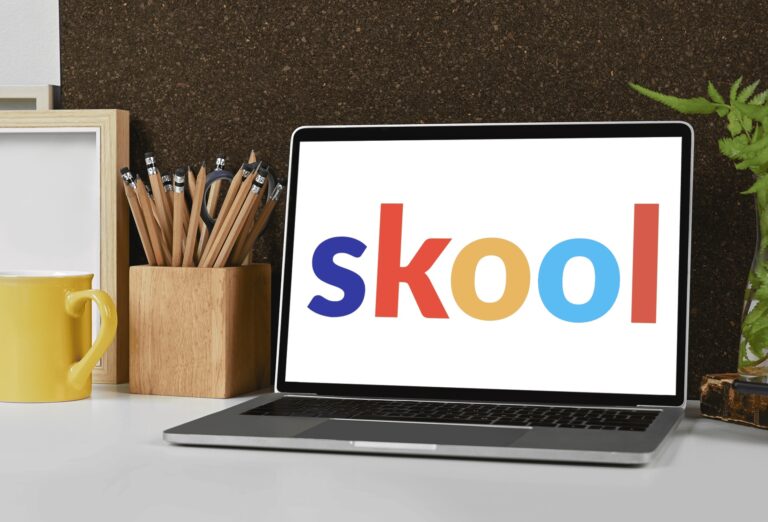Monetize Your Knowledge: How Skool Helps You Launch a Community-Driven Course

Imagine waking up every morning, getting onto your laptop, and earning money from the abilities you’ve learned or the knowledge you have without ever setting foot in an office. Sounds too wonderful to be true? That’s not the case. You may be thinking, “But I lack the necessary skills to accomplish that.” The good news is that you don’t need to be an expert right away. In reality, with the right advice and tools, anyone can develop the high-income abilities required to start making money online.
Sharing expertise has moved beyond traditional classrooms and into dynamic, online communities where producers may interact directly with their consumers. Skool and similar platforms bridge the gap between community involvement and formal learning, making it easier than ever to monetize your expertise. This article will help you through the process of creating, engaging, and profiting from a community-driven course using Skool.
What is Skool?
Skool is an online community platform. Skool is an all-in-one platform that combines the features of a social network and a learning management system (LMS).
You may either join existing communities or start your own. Some communities are free, while others are charged. It’s created for creators, educators, and entrepreneurs to:
- Create engaging online communities.
- Provide organized instructional content.
- Earn revenue through memberships, courses, and events.
Skool, unlike standard LMS systems, focuses on community development, allowing users to engage with one another while engaging with your content. You can check out more about Skool and give it a shot for passive income.
Why Choose Skool for Knowledge Monetization?
Skool.com is a popular platform for building a private online community for corporations or organizations. Skool.com stands apart for several reasons when it comes to creating an online community for your business or group.
Ease of Use: Skool.com has a clean, elegant UI that looks like a Facebook profile and feed structure. The search bar tool provides quick access to comments, members, courses, and postings.
Gamification: Skool.com’s gamification function enables users to create and share gamified material, making it an appealing alternative for organizations seeking to establish an exclusive online community.
Skool.com provides a unique and customized gamification element that promotes community interaction through an interesting ‘point’ experience. With nine levels to play with, you may offer special bargains, subscriptions, events, or new courses as members advance.
Flexibility: Skool.com provides a variety of functionality and customization possibilities, such as private, public, paid, free, or a combination of both. Membership prices may be easily customized.
Straightforward price plan: Skool.com’s price plan is straightforward and reasonable, costing $99 per month with no yearly contracts or hidden charges. This is good value for money, and Skool.com provides a 14-day trial to test its features firsthand.
Versatile: Skool.com is versatile and suitable for a variety of company kinds, including educators, organizations, online producers, and coaches. It creates a lively learning community that expands beyond traditional borders, establishing stronger relationships with students and hosting relevant debates.
Courses: Skool.com’s built-in course creation function, ‘Classroom,’ allows users to develop and share new courses only with their Skool community. This enhances the learning experience and elevates it above the conventional online community platform.
Membership profile: Skool.com’s extensive member profiles enable members to quickly add connections to their social network channels, display personalized text, highlight their levels, and view their contributions. The points system allows users to see how many points they’ve earned, which promotes a devoted community.
Integrated calendar: Skool.com’s internal chat and calendar functionality eliminates the need for third-party services like Slack, allowing for private and direct communication. It also lets users interact and converse with any member of the mobile app. Skool.com also has a built-in calendar tool that substitutes external Microsoft or Google Calendars, allowing users to create, schedule, and browse group events from their dashboard.
Skool.com membership also provides monetization opportunities. You may convert your knowledge into a successful business by giving memberships and subscriptions to your community. Offering memberships allows you to provide unique premium content, additional resources, or individual help, enhancing the overall learning experience and providing members a sense of belonging.
You may also monetize your expertise by providing premium subscription services to Skool.com users, assuring a steady cash stream while continually supplying high-quality instructional content.
User-friendly mobile app: Finally, Skool.com’s user-friendly mobile app enables users to keep in touch with their community even when they are busy. Overall, Skool.com provides a full platform for creating and sustaining a community.
A step-by-step guide for using Skool to turn expertise into a profitable community-driven course.
Step 1: Structure Your Course
Identify your expertise: Begin by identifying a subject in which you have both competence and love. Identify your target audience and the exact difficulties or goals they confront.
Develop a Curriculum: Divide your information into manageable pieces. For example:
The introduction: It provides an overview of the subject and its consequences.
Core Content: Detailed teachings organized into manageable stages.
Advanced Insights: detailed tactics or specialty approaches.
Use Skool’s Classroom Tab to organize these modules so that attendees may easily explore the information.
Include interactive elements: quizzes, tasks, or group discussions can help learners stay focused and participate actively.
Step 2: Developing and Engaging Your Community
Create a welcoming
Create a welcoming environment: Use the skool discussion boards to welcome new members and encourage them to express their aspirations. Setting a pleasant, collaborative tone allows people to feel appreciated.
Gamify the experience: Use Skool’s gamification elements, including leaderboards, to reward active users. This fosters friendly rivalry and encourages continued involvement.
Host live events: Skool’s calendar function allows you to arrange live Q&A sessions, webinars, and seminars. These events enable attendees to interact directly with you, resulting in greater ties.
Encourage peer-to-peer support: Facilitate group interactions in which members may share ideas, solve problems, and celebrate successes. Community support improves the learning experience while reducing your effort.
Step 3: Monetize Your Course
Skool provides numerous options for generating revenue from your community-driven course:
Tiered memberships: Offer several subscription levels. For example:
Basic membership provides access to core material and forums.
Premium Membership: offers live coaching sessions, special content, and other benefits.
Paid Workshops and Masterclasses: host specialist events that delve deeply into certain subjects. Charge a price for these sophisticated, interactive seminars to generate income.
Course Sales: Sell lifelong access to specific courses or put together a package deal for many courses. Use Skool’s integrated tools to complete the transaction smoothly.
Step 4: Ensuring Long-Term Growth
Measure key metrics: Monitor engagement, member retention, and course completion rates to assess effectiveness and identify areas for improvement.
Constantly update content: Keep your community interested by providing new content or upgrading old modules depending on feedback and industry trends.
Foster Loyalty: Shoutouts or unique awards might help to recognize active members. Encourage them to invite others, and use word-of-mouth marketing to naturally develop your community.
Many creators have utilized Skool to transform their skills into vibrant communities. For example, business coaches and fitness instructors have used the platform to conduct valuable courses while maintaining active member interactions. According to Skool’s community principles, organizing information around concrete tasks and ensuring regular involvement are critical to success.
Conclusion
Skool helps artists monetize their knowledge by creating interactive, community-driven courses. Skool’s strong engagement and monetization capabilities make it easier to transform knowledge into a commercial endeavor while keeping participants engaged and supported.
If you’re ready to turn your skills into a vibrant community and a sustainable cash stream, Skool might be the right platform to get you started.
This post may contain affiliate links and we may earn commissions. Learn more in our disclosure.



